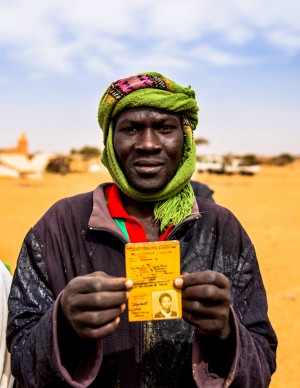In Northeast Nigeria, refugees returning from Cameroon are facing new emergency situation
Nigerian refugees, who recently returned from Cameroon, are facing enormous challenges and dire living conditions due to lack of food, shelter, water and sanitation, as well as limited and overstretched health facilities
Maiduguri, 9 June 2017 – Nigerian refugees, who recently and spontaneously returned from Cameroon, are now facing enormous challenges and dire living conditions due to lack of food, shelter, water and sanitation, as well as limited and overstretched health facilities. This is particularly the case in Pulka and other areas of return in northeast Nigeria, where returnees who had arrived in Banki since April are being relocated.
More than 12,400 refugees returned abruptly to Banki, Borno State, in April and May, bringing the total of returnees to over 19,000. In Banki, some 100 kilometres southeast of Maiduguri and home to nearly 45,000 people, refugees are arriving to difficult conditions. The returns have created enormous pressure on the very few existing services, stretched to the limit in servicing internally displaced people (IDP) who were already in Banki.
In the past week, UNHCR Protection team on the ground has reported on the increasing risks and incidents. “The prolonged absence of food has led to serious protection risks for the population,” says Cesar Tshilombo, Head of UNHCR Sub Office in Maiduguri. “We are receiving numerous reports of cases of domestic violence, forced marriages, unwanted pregnancies, and human rights abuses. This includes sexual exploitation, in exchange for food and other services in Banki”, he adds.
Many returnees continue to sleep in open spaces as the rainy season started. There are only 304 latrines and 136 bathing areas for a population of nearly 45,000 people in Banki and, with only one health facility in the town, critical medical cases need to be transferred to Cameroon. There is, however, no ambulance to transport patients.
“Mortality among returnees is alarming and is attributed to a much reduced medical capacity, malnutrition, and exposure to harsh weather conditions,” says Jose Antonio Canhandula, UNHCR Representative in Nigeria. “The situation requires a coordinated approach by the humanitarian community to reverse this dangerous trend. With overcrowding and current lack of water and sanitation facilities, UNHCR and other humanitarian actors predict a growing risk of a disease outbreak if urgent steps are not taken to reverse the current situation,” he adds.
In Banki, UNHCR has distributed core relief items to returnees, such as mattresses and blankets, mosquito nets, cooking pots, buckets, solar lanterns, slippers, sanitary pad, and even soap. UNHCR is calling on other humanitarian actors to intervene in areas where they have expertise and resources. The need is particularly acute for shelter, food, water and sanitation, health and education. Due to the lack of teachers, children, who account for half of the population in Banki, have had no access to education in the past three months.
In Pulka, humanitarian actors are working frantically to resolve the acute water scarcity. In the current situation, and with Pulka already overwhelmed, the Borno State government has identified four locations, in Bama, Gwoza, Ngoshe and Gulumba, where 7,000 to 10,000 IDPs and returnees are expected to be relocated, based on effective military presence to ensure security. Some returnee refugees and IDPs from Pulka will be relocated to Gwoza, Ngoshe and Gulumba, while the IDPs from Banki will be relocated to parts of Bama.
“Refugees returning from Cameroon were expected to return to their areas of origin, but most are now returning to second displacements,” says M. Canhandula. “Such a situation was foreseeable and this is why we appealed to refugees not to hurriedly return to Nigeria – a call repeated by the Nigeria government counterparts who accompanied us in a recent visit to Nigerian refugees in Cameroon,” he says.
Humanitarian access outside the main administrative areas in Northeast Nigeria remains a challenge, and movement of humanitarian staff and relief items by road is not the best option. There is no adequate field presence of aid agencies, and the lack of resources to address the critical needs of returnees remains a concern. These developments, in particular the precipitous return of refugees continue to undermine the effectiveness of humanitarian response.
For more information, please contact:
- in Dakar: Romain Desclous, Senior Regional Communication & Public Information Officer, desclous@unhcr.org, +221 77 786 396 385
- in Abuja: Hanson Ghandi TAMFU, External Relations & Public Information Officer, tamfu@unhcr.org, +234 902 757 3068


















